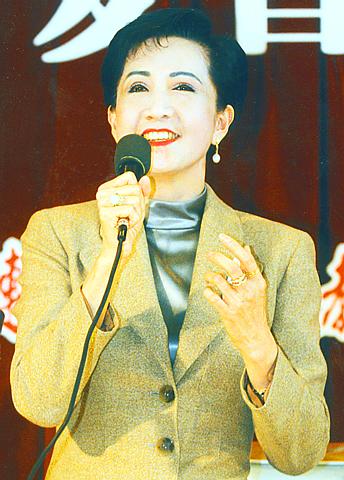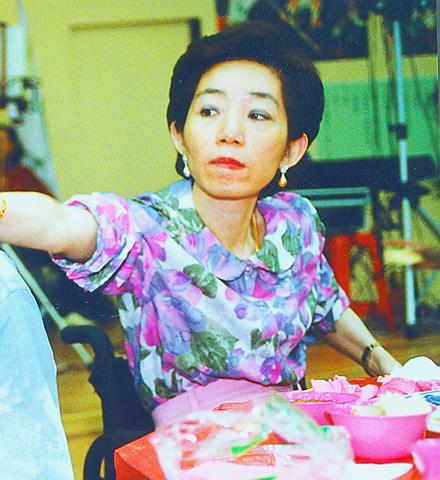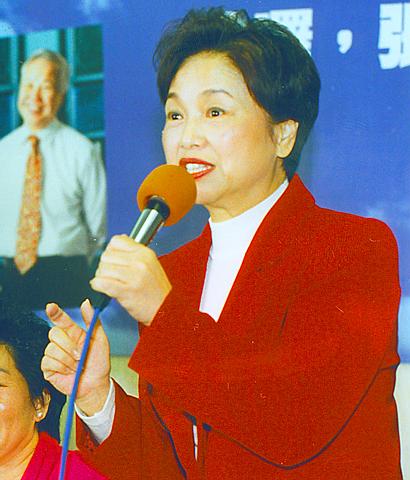A former "Miss ROC" beauty queen, Lien Fang Yu (
In an opinion poll released on Jan. 29 by the SET cable network, 33.3 percent of female respondents described Lien Fang Yu as "the most fitting candidate for first lady," while Chen Wang-shui (
But KMT grass-roots leaders are not convinced of Lien Fang Yu's vote-pulling power.

FILE PHOTO
During a swing through the counties last November aimed at boosting Lien's campaign, KMT secretary-general Huang Kun-hui (
"Both Lien Fang Yu and Liu are `poison' to the KMT's presidential box office," the unidentified KMT local official said.
Lien Fang Yu's problem is that with her "Miss ROC" background and marriage into the family of the wealthy vice president, she appears to have lived in a family-oriented gilded cage of privilege with which people find it difficult to identify.

FILE PHOTO
At the same time she is neither media-savvy nor a good campaign speaker. As a result she has met with a backlash of unpopularity from the public -- much as her husband has during the campaign.
"Unlike Soong's wife, Chen Wang-shui, Lien Fang Yu pays more attention to family and her children than to interaction with the public. So, in terms of exercising campaign language, Lien Fang Yu is not as familiar as Chen," said Chen Shei-saint (
Chen also pointed to a lack of political guile.

FILE PHOTO
"Lien Fang Yu is a decent and innocent person, and she has always said whatever flashes into her mind. No doubt, she has no intentions to hurt anybody, but her words could easily be given new twists by either the opposition or the media."
Her daughter Lien Hui-hsin (連惠心) has similar concerns about her.
"My mother treats everyone as if they are a good guy," she says. "I sometimes worry that she may be deceived [by others]."
In such a scenario, Chen and other campaign counselors have advised Lien Fang Yu to do "less talking, more handshaking.''
Soong's secret weapon
Although these would-be members of the "first wives' club" all claim to dislike engaging in political affairs, both Soong's wife, Chen Wang-shui, and the wife of the DPP's Chen, Wu Shu-jen, find themselves quite welcomed -- at least compared with Lien Fang Yu -- by their husbands to help boost campaign momentum.
Soong once described his wife as his "secret weapon,'' saying he could always rely on her to lend an ear to grass-root opinions.
Chen has said that she has more extensive channels for gathering information at the grassroots than her husband because his political prominence makes it difficult to meet people in natural settings.
Chu Tzong-ko (
"Chen enjoys going to buy things on the street, and in the meantime she can find out what the public is thinking,'' Chu said.
"With Chen's easy-going personality, we believe she could well draw in many votes for Soong's campaign," Chu said.
While Chen has tried her best to boost her husband's presidential bid, she has, however, never concealed her contempt for politics, whether in public or on private occasions.
She has said previously that she would be the "loyal opposition in my family" in order to monitor Soong's performance as an elected official.
"I hate politics. But ironically, I married a man who cares about politics above anything else," Chen said.
"I have no idea how power can corrupt people, but I will do my best to prevent Soong from being corrupted by this power," Chen added.
`The most difficult job on the planet'
The relationship between the DPP's Chen Shui-bian and his own wife, Wu Shu-chen, is probably even more interesting than that of the Soongs.
While the wives of both Soong and Chen say they dislike their husbands' devotion to politics, Wu's opinions on the subject are even more frank.
Wu herself has also played an even more hard-line role than Soong's wife, despite a physical handicap that confines her to a wheelchair.
Wu was paralyzed after being run over in 1985 in what many suspect was a politically-motivated assassination attempt.
"Being a politician's wife is the most difficult job on the planet. I would recommend that all women should never allow their husbands to take part in politics. It's just like a drug abuser -- once he starts, he'll never stop," Wu said on Jan. 31.
"A-bian [Chen's well-known diminutive] always gives me different reasons when he needs to join a campaign and he has already signed piles of guarantees for me. I don't know when he will really come back to me.''
With the presidential election fast approaching, Wu said as each day passes, she feels less pain. No matter whether her husband won or lost, "I will get some benefit," she said.
"If he wins, our labor during all these days will have been worth it; if he loses, I can get my husband back,'' Wu said.
In spite of her scorn for politics, she is still someone willing to give Chen extra impetus to overcome obstacles to his political career.
"Twenty years ago, it was Wu that persuaded Chen to accept the appointment as lawyer for two of the defendants in the Kaohsiung Incident and that marked the beginning of Chen's political pursuits," said Luo Wen-jia (羅文嘉), the DPP's spokesperson and a top aide to Chen.
"Wu is the master of the family, while at the same time, Chen has also relied on her instincts to help him make significant decisions," Luo said.

DAREDEVIL: Honnold said it had always been a dream of his to climb Taipei 101, while a Netflix producer said the skyscraper was ‘a real icon of this country’ US climber Alex Honnold yesterday took on Taiwan’s tallest building, becoming the first person to scale Taipei 101 without a rope, harness or safety net. Hundreds of spectators gathered at the base of the 101-story skyscraper to watch Honnold, 40, embark on his daredevil feat, which was also broadcast live on Netflix. Dressed in a red T-shirt and yellow custom-made climbing shoes, Honnold swiftly moved up the southeast face of the glass and steel building. At one point, he stepped onto a platform midway up to wave down at fans and onlookers who were taking photos. People watching from inside

A Vietnamese migrant worker yesterday won NT$12 million (US$379,627) on a Lunar New Year scratch card in Kaohsiung as part of Taiwan Lottery Co’s (台灣彩券) “NT$12 Million Grand Fortune” (1200萬大吉利) game. The man was the first top-prize winner of the new game launched on Jan. 6 to mark the Lunar New Year. Three Vietnamese migrant workers visited a Taiwan Lottery shop on Xinyue Street in Kaohsiung’s Gangshan District (崗山), a store representative said. The player bought multiple tickets and, after winning nothing, held the final lottery ticket in one hand and rubbed the store’s statue of the Maitreya Buddha’s belly with the other,

Japan’s strategic alliance with the US would collapse if Tokyo were to turn away from a conflict in Taiwan, Japanese Prime Minister Sanae Takaichi said yesterday, but distanced herself from previous comments that suggested a possible military response in such an event. Takaichi expressed her latest views on a nationally broadcast TV program late on Monday, where an opposition party leader criticized her for igniting tensions with China with the earlier remarks. Ties between Japan and China have sunk to the worst level in years after Takaichi said in November that a hypothetical Chinese attack on Taiwan could bring about a Japanese

‘COMMITTED TO DETERRENCE’: Washington would stand by its allies, but it can only help as much as countries help themselves, Raymond Greene said The US is committed to deterrence in the first island chain, but it should not bear the burden alone, as “freedom is not free,” American Institute in Taiwan Director Raymond Greene said in a speech at the Institute for National Defense and Security Research’s “Strengthening Resilience: Defense as the Engine of Development” seminar in Taipei yesterday. In the speech, titled “Investing Together and a Secure and Prosperous Future,” Greene highlighted the contributions of US President Donald Trump’s administration to Taiwan’s defense efforts, including the establishment of supply chains for drones and autonomous systems, offers of security assistance and the expansion of